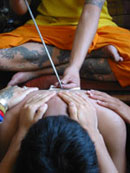Talking With University Students
It is compulsory for children between the ages of six and fifteen to attend school in Thailand. After the mandatory schooling is completed, attendance rates drop up to 50 percent, according to some statistics. Only a small percentage of students continue their education beyond secondary school.
Students in secondary programmes can choose vocational or academic courses. Vocational programmes teach skilled trades while academic courses focus on preparing students to enter university. The inability to pass entrance exams, the need to earn money and/or inability to meet the costs of higher education makes attending university impossible for many.
Tuition costs range from extremely modest to expensive. Public university tuition can be less than US$100 a semester whereas tuition at elite private universities can reach up to 100 times more. In Thailand, as in the rest of the world, education means opportunity. Those who manage to make it to university are more than proud of themselves, and their parents are even prouder. Access to education at any level and the quality of the education offered varies from region to region within Thailand. Bigger cities invariably offer bigger learning opportunities.
proud of themselves, and their parents are even prouder. Access to education at any level and the quality of the education offered varies from region to region within Thailand. Bigger cities invariably offer bigger learning opportunities.
I recently headed out to Chiang Mai University, the largest school in northern Thailand, to sit down with some students and chat about their lives. I had a short wander through the campus, which was very scenic and green. I then detoured through one of the main buildings where I accidentally entered an impressive computer lab filled with students. Most were using the high-tech equipment to play computer games. Upon exiting the building I ran into Tetat, Chavit, and Piranan (ages 20, 19 and 20, respectively) taking a break outside in the shade at a table. All three are third-year students in a four-year computer science programme. They are learning Visual Basic, C++, Java, Assembly language, and website design.
When asked why they chose to enter their specific course, all their answers resounded with practicality. “I think after it I can get a good job and I like it,” “Computers are important for every job.” “I am interested in new technology and in the future,” was the response.
they chose to enter their specific course, all their answers resounded with practicality. “I think after it I can get a good job and I like it,” “Computers are important for every job.” “I am interested in new technology and in the future,” was the response.
The tuition cost is 5,000 baht (US$113) per semester. Piranan lives at home with her family and drives 20-minutes to school each morning in her car. Tetat lives in off-campus student housing and pays 2,000 baht a month for rent. Chavit stays in on-campus student housing and pays only 1,700 baht to live there for the entire term. When asked about the cost of food per day, the group agreed fully upon the figure of 100 baht, but explained that sometimes they eat fast food (KFC, Pizza Hut, Sizzler), which is very expensive.
All three students have mobile phones and none would admit to having a boyfriend or girlfriend. “No interest,” “No time,” and “No luck,” were the given reasons. When asked what they enjoy doing in their spare time, Tetat stated, “Studying, playing computer games and surfing the internet.” Piranan said, “Going to the movies, singing karaoke and visiting local waterfalls,” and Chavit claimed, “Eating at a local famous restaurant, like one that serves local steak,” is one of his favourite things to do.
doing in their spare time, Tetat stated, “Studying, playing computer games and surfing the internet.” Piranan said, “Going to the movies, singing karaoke and visiting local waterfalls,” and Chavit claimed, “Eating at a local famous restaurant, like one that serves local steak,” is one of his favourite things to do.
None of the three students had a job at present, although Piranan said she earned money in the past by babysitting. When asked how much spending money they needed per month the answer ranged from 3,000 baht-5, 000 baht (US$68-113).
When asked what each would do if hypothetically given 5,000 baht, Piranan quickly stated, “Keep it in the bank or go out shopping. I might spend it on clothes or some interesting food to eat.” Chavit declared, “Take extra classes,” and Tetat answered, “Spend it all on books about computers.”
Ten years from now Chavit hopes to be selling computers and computer programmes and thinks he will earn about 15,000 baht per month. Tetat sees himself being married with children and working as a systems analyst earning 50,000 baht per month. Piranan hopes to own her own business and make 30,000 baht per month. They explained that Chiang Mai is a ‘low-tech’ town and that moving to Bangkok to get a job is common.
When asked about their college experience, some of the answers given were: “It is the best time of your life!” “It’s a time for friends and discovery,” “You don’t have to work,” and “My future depends on it!”
When questioned as to what they like most about their country, the friendly people, interesting culture, beautiful temples and its natural beauty were on the plus side; traffic jams in Bangkok, dirty air, lax law enforcement, drugs and the heat on the negative.
When asked what their message to the readers of this column might be, they declared, “Come to Thailand! The people are shy but friendly and there are a lot of things to see here!”
